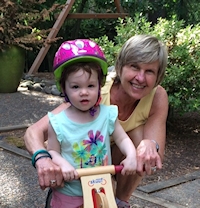

I am a four-time survivor of ovarian cancer over the course of the last eight years. I am also an exercise fiend and a conscientious eater. I love to cook, and in general I consider myself to be really healthy and active.
In September 2006 I was 54, and living in Cabo San Lucas, Mexico with my husband. I was always pretty thin but I was losing a little weight, which I attributed to the fact that my husband and I were really busy with work. He was travelling a lot and so I wasn’t cooking as often. I was pretty new into menopause and, for me, just about everything I felt or any symptom I had (bloating and more-frequent urination), I attributed to menopause.
Finally, there came a time when I found that I was getting up to urinate about four or five times a night. I made an appointment with a gynecologist I had seen once in Cabo. As she was examining me she said “Can’t you feel that?” And, sure enough, as she was pressing on my ovary I could definitely feel something there. She recommended that if I had American health insurance (which I did) that I get on a plane ASAP and get it checked out. I did just that.
My CA125 blood test result was over 1800. Within about three weeks I had surgery. The tumor we had felt was pressing against my bladder which is why the frequent urination was occurring. I was diagnosed with stage IIIC ovarian cancer. The cancer was found on my omentum as well as my ovaries. After surgery, I underwent intravenous (IV) and intraperitoneal (IP) chemotherapy with Taxol and Cisplatin. It was very difficult. I was a pretty sick woman but I made it through.
I completed treatment six months later in March 2007. I slowly got back to my life and returned to Cabo and our business. I had a CA125 blood test and a pelvic exam every three months. My CA125 blood test results tend to run in the 7-10 range when I am cancer free.
About a year later in March of 2008, I felt a lump in the same place as my first tumor. Of course I freaked! I had a CA125 test done in Mexico, the results of which were about 20. My doctor suggested I return to the United States and have a follow-up CA125 test in one month, at which point we would decide our course of action.
Sure enough, I had another tumor. It was in the same place as the first one. I had my second surgery in June 2008, followed by four rounds of Gemzar. This chemo treatment was a breeze compared to the first time except that my white cell count was not rebounding very well, and treatment was often delayed. My doctor, who is a local gynecologic oncologist, and I decided to stop treatment after four rounds because there was no evidence of disease (my CA125 was at 8) and my bone marrow was being compromised. This was October 2008.
Due in large part to my cancer experience, I went back to graduate school to get a Masters in Social Work. I started school in the fall of 2010. I felt great, and loved school.
Unfortunately, in March 2011 my CA125 started rising. A PET scan showed a small mass growing at the same spot as the previous tumors! So during summer break of grad school I had my third surgery followed by chemotherapy treatment. Like the second surgery, this one was performed by my gynecologic oncologist.
This time, my treatment began with a combination of Doxil and Carboplatin but due to a chemo drug shortage of Doxil, and the fact that I felt horrible after a single dose, we opted to treat with just Carboplatin. I completed four rounds of chemo and was able to resume school in the fall. I have since graduated and am now an active Social Worker.
My fourth and hopefully-final surgery for a tumor was in January 2013. I was treated with targeted radiation and then more chemo (Cytoxan and Avastin). Currently, I am taking a summer vacation from Avastin and will do as my doctors suggest after enjoying a chemo-free summer.
I believe I am a rather unusual case of ovarian cancer in that I have been lucky enough to be able to be surgically treated four times. I am NOT unusual in that many of my initial symptoms were easily confused by both me and the medical profession as Irritable Bowel Syndrome (IBS) or menopause. As an ovarian cancer awareness advocate, I think it is important to know the symptoms of ovarian cancer and to see a doctor about them.
Editor’s Note: Teena is a volunteer with the Ovarian Cancer Alliance’s Survivor’s Teaching Students ® program, in which she speaks to the medical community about ovarian cancer. Teena says that she is married to her “dream husband Jay” and loves her work as a therapist. She hopes to work with cancer patients eventually. Teena, who now resides mostly in the Northwest, is a grandmother to two granchildren. Her hobbies include cooking, exercising, running and walking her dog.
